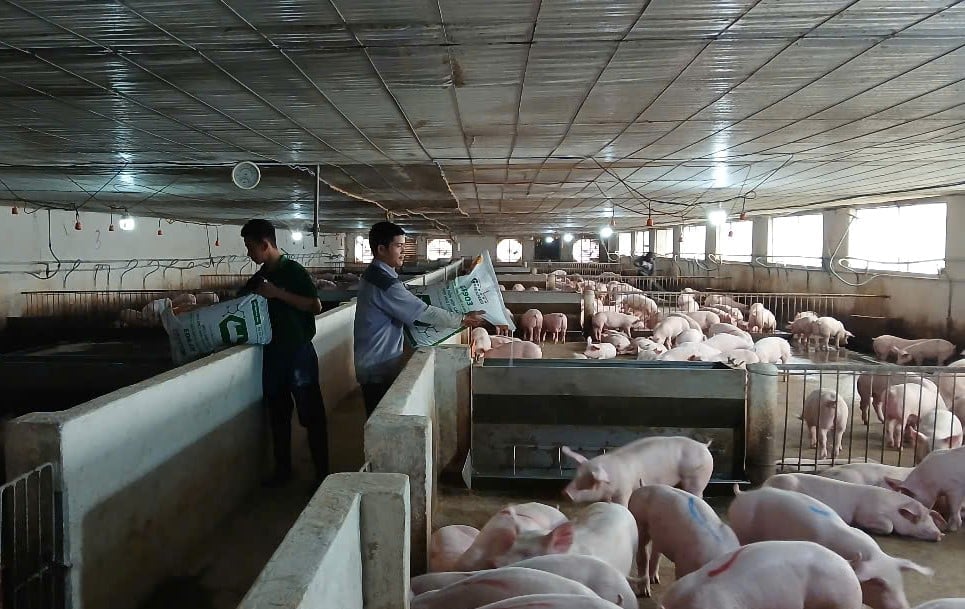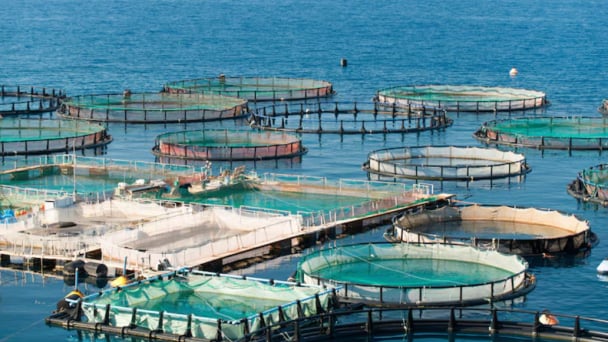June 4, 2025 | 15:38 GMT +7
June 4, 2025 | 15:38 GMT +7
Hotline: 0913.378.918
June 4, 2025 | 15:38 GMT +7
Hotline: 0913.378.918
According to To Thanh Tung, Director of Nhat Vinh Co., Ltd. (Nhat Vinh Company) in Cat Hiep Commune, Phu Cat District, Binh Dinh Province, his farm maintains a relatively stable herd of 500 breeding sows and 500 market pigs.

Disease prevention initiatives in pig farming help reduce production costs. Photo: V.D.T.
In 2024, To Thanh Tung’s farm supplied more than 10,000 piglets to the market, with prices ranging from 2 to 2.4 million VND per 10 kilograms of piglet. These figures mark an increase of 20% compared to the previous year. By utilizing a closed-loop farming process, modern cold housing systems, and strict disease control measures, Nhat Vinh Company has maintained stable piglet quality while effectively preventing disease outbreaks.
As disease outbreaks continue to prevail in neighboring provinces, Nhat Vinh Company’s pig farm has implemented several strict preventive measures, assigned employees to fixed areas, and limited movement to protect the herd.
“We strictly comply with biosecurity farming protocols to protect our pig herd from diseases,” emphasized To Thanh Tung.
By adopting biosecurity practices, pig farmers in Binh Dinh Province have also achieved success despite market fluctuations and the threat of disease outbreaks.
Nguyen Van Cong, a pig farmer in Tan Hoa Bac Hamlet, Cat Hanh Commune, Phu Cat District, shared, “Farmers can increase their profits with effective disease control efforts. Despite fluctuations in live pig prices, the average selling price is nearly 61,000 VND per kilogram, which is an increase of 3,000 VND per kilogram from last year, resulting in high returns for farmers. At present, pork prices range from 68,000 to over 70,000 VND per kilogram. I reared three batches of pigs, totaling 480 heads, in 2024. I earned nearly 3 billion VND in revenue and a profit of nearly 720 million VND.”
Nguyen Hai Dao, a farmer in Thach Long 1 Hamlet, An Tuong Dong Commune, Hoai An District, has pioneered the practice of biosecure pig farming for over ten years. His 2.5-hectare farm currently houses 600 breeding sows. Each year, his farm supplies between 6,000 and 7,000 market pigs to the market, generating over 39 billion VND in revenue and a profit of 7-8 billion VND.
“The key to our farm’s success lies in the strict control over worker access and rigorous sanitation procedures to prevent disease outbreaks. Additionally, we ensure full vaccination for the pigs,” Dao added.
Hoai An District, home to Binh Dinh’s largest pig population with 266,000 pigs, currently supports five large-scale high-tech pig farms, 1,926 medium- and small-scale farms, and five certified disease-free farms.
However, according to Nguyen Thanh Vuong, Director of the Hoai An District Agricultural Services Center, household-based pig farming activities in the district lack coordination, posing a high risk of disease outbreaks. On the other hand, the adoption of modern closed-loop farming following VietGAP, organic, and biosecurity standards is relatively limited.
Consequently, Hoai An District plans to establish concentrated farming zones, promote high-tech farming, and develop disease-free farms to create a biosecure livestock region in 2025. The district will also guide farmers on registering their farming activities in compliance with regulations.
“In 2025, Hoai An District will promote local livestock production activities by employing advanced technology, improving farmers’ expertise through agricultural extension programs, and providing vocational training in compliance with VietGAP, organic, and high-tech farming standards,” Director Vuong explained.

Binh Dinh aims to promote concentrated livestock farming and reduce small-scale pig farming in 2025. Photo: V.D.T.
According to Huynh Ngoc Diep, General Director of the Binh Dinh Province's Sub-Department of Livestock Production and Animal Health, the adoption of biosecure pig farming practices has become increasingly common among local farms, smallholders, and households. These practices include strict hygiene control in barns, monitoring the movement of people and vehicles in farming areas, regulating breeding stock and feed sources, and deploying comprehensive vaccination campaigns.
“To date, Binh Dinh houses 34 high-tech pig farms specializing in breeding stock production. These farms, along with smallholders and households that apply biosecurity measures, have consistently achieved positive profitability in recent years,” Diep said.
He added that provincial authorities will coordinate with local stakeholders to implement the province’s livestock development strategy, which includes establishing disease-free zones and facilities, forming key livestock farming areas, and promoting awareness of the benefits of biosecure farming.
“The development strategy for Binh Dinh’s livestock sector in 2025 will focus on expanding concentrated livestock farming in addition to gradually reducing small-scale pig farming. The province will also develop disease-free farming zones and promote high-tech application to support processing, thereby enhancing the value of local livestock products,” said Cao Thanh Thuong, General Director of the Binh Dinh Province's Department of Agriculture and Environment.
Translated by Nguyen Hai Long

(VAN) Technology is redrawing the map of Vietnamese aquaculture: more modern, greener, and more sustainable.

(VAN) Novel process harnesses machine learning to reveal groups of genes that determine how efficiently plants use nitrogen.

(VAN) Several scientists and farmers are experimenting with soil treatment in some key durian-growing regions such as Cai Lay (Tien Giang), Dak Song, Gia Nghia, and Dak R’lap (Dak Nong).
/2025/05/25/4127-3-073637_820.jpg)
(VAN) Thanks to the promotion from an FAO-implemented project, vegetable production in greenhouses in Moc Chau has seen strong development, from 1.5 hectares in 2021 to nearly 50 hectares in 2024.

(VAN) FAO has recently supported USD 140,000 to implement the project 'Risk mitigation human-animal interface risks through disease control initiatives in pig farming.'

(VAN) The People's Committee of Tra Vinh province has approved an adjustment to the investment policy for the Green Hydrogen Plant project, increasing its area to approximately 52.76 hectares.
![Reducing emissions from rice fields: [2] Farmers’ commitment to the soil](https://t.ex-cdn.com/nongnghiepmoitruong.vn/608w/files/news/2025/05/05/dsc08881jpg-nongnghiep-140632.jpg)
(VAN) Clean rice cultivation model in Thuong Tan commune, Bac Tan Uyen district, is assisting local residents in achieving sustainable agriculture by substantially reducing costs, increasing productivity, and protecting the environment.